
We’ve all sat through it before…or…stood through it, that is.
As Anand Sahib ends, we stand for Ardaas and collectively reflect on the lives and accomplishments of the Gurus and the 18th century martyrs who gave their lives to preserve our Sikh way of life. Somewhere in between this reflection, and wishing for “Sarbat da Bhala“, we take a bizarre detour in to the “ins and outs” of our community.” Yes…I am referring to the lengthy list of births, birthdays, graduations, anniversaries and other milestones we find in the middle of our Ardaas.
I’m not sure when this practice started; where a member of the sangat would make an offering to the Gurdwara so an “Ardaas” can be done on their behalf. Birthdays are most common week to week, but I have heard more creative ones – celebrating a new job, new car, first mother’s day, wishing someone well on an upcoming exam, or safe travels for someone’s trip to India. Some even taken advantage of this process, by doing an “Ardaas” on behalf of their business week after week – essentially advertising their local store, while they have the entire community’s ear. I’ve raised this issue to the committee that perhaps there needs to be a better way to handle these “community announcements” rather than during Ardaas…I mean, seconds after we recount the martyrs who were cut limb by limb and scalped, we collectively thank Waheguru for Tinku’s new Benz? It just doesn’t seem right.
The Sikh Gurus never believed in the exclusivity of their teachings. The Gurus undertook travels to spread their message to peoples of different cultures in their own native languages. The Gurus did not believe in the ideas of any language being ‘sacred’ or ‘special’. [link]
I found the above quote to be quite interesting given a recent conversation I’d had with a close friend of mine. She felt that the Guru Granth Sahib was not accessible to most Sikhs and this inaccessibility was actually detrimental to those Sikhs who wanted to understand the teachings of the Gurus. She recently found herself, on several occasions, wanting to refer to the Guru Granth Sahib in order to obtain some enlightenment on things occurring in her life. There were several obstacles she felt that prevented her from doing so. First, she doesn’t read Gurmukhi (although she is learning) and second, having a sound understanding of Gurmukhi doesn’t necessarily translate to comprehension. While I agree that it is important for each of us to learn Gurmukhi, to help deepen our understanding of Gurbani, I wonder how many Sikhs of our generation are able to truly do so.
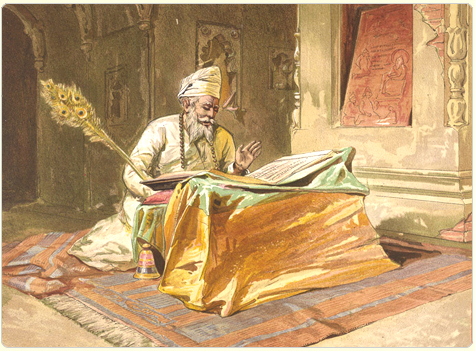 The Christian faith, for example, focuses heavily on bible study and encourages youth to participate in these groups at a young age. In our Gurdwaras, we place a large emphasis on learning Punjabi – an important element in having the tools to access our scriptures. However, we hardly pay any attention to teaching youth how to read and understand Gurbani. The Guru Granth Sahib is the only religious scripture in the world which contains ideas and thoughts of great saints from non-Sikh backgrounds. Without a doubt, it is unique in all sense of the word. If the Guru Granth Sahib is the most important source of wisdom for Sikhs – then why can’t the majority of Sikhs understand it?
The Christian faith, for example, focuses heavily on bible study and encourages youth to participate in these groups at a young age. In our Gurdwaras, we place a large emphasis on learning Punjabi – an important element in having the tools to access our scriptures. However, we hardly pay any attention to teaching youth how to read and understand Gurbani. The Guru Granth Sahib is the only religious scripture in the world which contains ideas and thoughts of great saints from non-Sikh backgrounds. Without a doubt, it is unique in all sense of the word. If the Guru Granth Sahib is the most important source of wisdom for Sikhs – then why can’t the majority of Sikhs understand it?
Last week, I wrote a wrap-up about the 10th Annual Jakara Movement Conference. Sikh Knowledge, a previously featured artist, wrote his thoughts on his blog.
However, an especially important post was written by Pashaura Singh Dhillon. For those that are regular langa(r)-eaders, then you need no introduction. In a post during last year’s presidential election, I introduced a Fresno Punjabi landmark – one of our many great poets.
At last week’s Jakara Movement Conference, Pashaura Singh delivered a powerful poem at the farewell banquet. On his own blog, he introduces the piece, written with a contemporary problem using a traditional Mirza meter. I quote at length:
I was invited to share a poem I wrote at the closing banquet of Jakara Movement. Jakara began in 2000 with a mission to call the next generation of Sikhs from all places, backgrounds and points of view to reflect on their past and prepare for the future. In 2009, they came together as the next generation of Sikhs to continue the process of empowering, engaging , and educating the Sikh community.
Kanwar Anit Singh Saini (Sikh Knowledge) and Kanwar Singh (Humble the Poet), two Canadian rappers and participants of 2009’s Jakara said it best. “1984 is all around us. It is happening in Rwanda. It is happening in Palestine. We should try to find connections with people who are also victims because then the minority becomes the majority.”
But I was not there to repeat what had already been reported or was going to be reported on this subject. As a poet I wanted to invite them to a different plane, whereby they not only take the message of what happened to the Sikhs 25 years ago but also what is happening all around the world today and how it relates to us all. A big picture where these compounded atrocities and excesses not only of humans on humans that are happening everyday but also collectively of humans on this planet Earth, which threatens its very survival. The victim of human’s inhumanity the Earth pleads with the princess of the Skies whose domain the fugitive from Earth is now so impatient to intrude. Without further adieu, here is “Umber Di Shehzadi De Naa: To the Princess of the Skies”

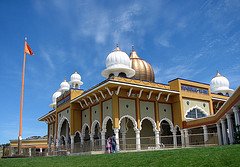 Two articles over the weekend got me thinking. I’ll get to them soon enough. Be patient!
Two articles over the weekend got me thinking. I’ll get to them soon enough. Be patient!
The issues aren’t new. I remember back to the late 1990s, when the community here in the Bay Area was moving to build the new San Jose Gurdwara. The Evergreen community protested and raised the typical objections – traffic, architecture that doesn’t ‘fit’ into the community, and sometimes the ‘undesirable neighbors’ argument.
Wherever Sikhs try to build something, these three arguments follow. The latest case…..Southall?
 International news outlets are a flutter with the latest: in the wake of an unseasonably hot, dry summer, the Bhakra Beas Management Board has decided to cut irrigation water to Punjab, Rajasthan, Haryana and Himachal Pradesh. The Punjab government has tried to alleviate the demand for water by curtailing its use of electricity, as well (many segments of the state run on hydroelectric power). Officials have a delayed monsoon has kept the reservoir behind the dam from being recharged. They insist the heat, and dryness, are unrelated to El Nino and a number of other weather-related phenomena.
International news outlets are a flutter with the latest: in the wake of an unseasonably hot, dry summer, the Bhakra Beas Management Board has decided to cut irrigation water to Punjab, Rajasthan, Haryana and Himachal Pradesh. The Punjab government has tried to alleviate the demand for water by curtailing its use of electricity, as well (many segments of the state run on hydroelectric power). Officials have a delayed monsoon has kept the reservoir behind the dam from being recharged. They insist the heat, and dryness, are unrelated to El Nino and a number of other weather-related phenomena.
But what if the impending drought and the water shortage are products of a more permanent weather shift? What if they are related to climate change?
As the economic down-turn leads to increased joblessness, many countries are paying immigrant workers to return to their home countries. Japan, Spain, and the Cezech Republic are paying immigrant workers to return home with the stipulation that they not migrate back to the aforementioned countries for an x-amount of years. Thus, freeing up jobs for citizens and creating a bandage solution to crime and homelessness-as if these issues are only an “immigrant problem”.
BBC’s “World Have Your Say” reported this week that Czech Republic is offering just under $1,000 per immigrant; the Spanish government has offered six months of unemployment benefits, around $18500; and Japan is offering $3,888 per Latino worker plus an additional $2,000 per dependent.
According to The Wall Street Journal, large numbers of immigrants are actually taking up the offers; however, some are choosing to bypass the pay-off. Many find that the money they borrowed to arrive in these countries far exceeds the amount being offered. It would be very difficult for them to return home and find jobs that would help them repay their loans-the very reason they immigrated abroad. Jobs at home don’t provide a reliable and sustainable source of income.
Ultimately, these “pay-offs” frame immigrants as the root cause of problems in foreign countries. Not only do immigrants take-away jobs from local citizens; in a declining economy their joblessness leads to crimes and homelessness. Once again, the scapegoat is immigrants. The Economist reports that paying off immigrants to return to their home countries is a temporary solution to deeper problems.
What do you think?
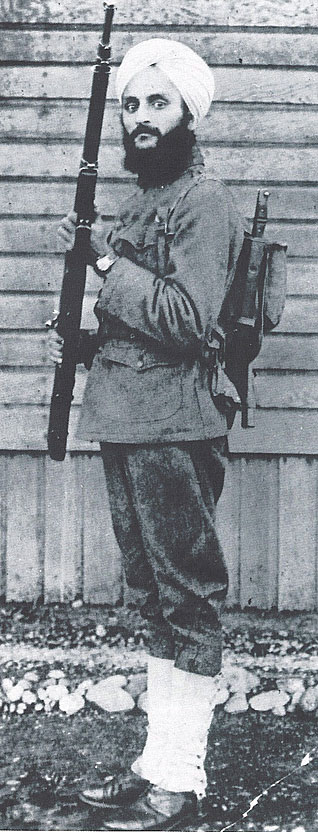 The Sikh Coalition recently announced that three Congressional representatives from New York and New Jersey wrote to Defense Secretary Robert Gates on behalf of their Sikh constituents regarding the Coalition’s “Right To Serve” campaign.
The Sikh Coalition recently announced that three Congressional representatives from New York and New Jersey wrote to Defense Secretary Robert Gates on behalf of their Sikh constituents regarding the Coalition’s “Right To Serve” campaign.
In their letters, Congresswoman Carolyn Maloney, Congressman Rodney Frelinghuysen and Congressman Joseph Crowley asked Secretary Gates to allow Sikh soldiers to serve with their articles of faith intact. The letters cited other Sikhs’ service in the US Armed Forces and in our allies’ militaries to support their argument that these men should be permitted to serve.
This an important milestone in what is likley to be a long and difficult process. In reference to this, I’d like to share a piece I wrote on sikhchic.com shortly before the launch of this campaign, titled – This We’ll Defend [The motto on the official seal of the United States Army. ]
Last fall, I went to an NFL game to watch my team face their arch rival on Sunday Night Football. As we were watching the pre-game warm-up, the gentleman next to me asked “So what do they think of football in your country?” I paused, and politely replied “Well, considering my country is America…we think pretty highly of it.” He attempted to re-phrase his question and after a few awkward exchanges, I yielded, and answered “Oh…you mean my ancestors, they are from Punjab…I’m not sure what Punjabis think of football.” We changed the topic to the upcoming game and ended our conversation.
I run in to these dialogues a lot. As I’ve gotten older, the occasional taunts and racial slurs I receive due to my articles of faith no longer faze me. I can always blame that on ignorance and lack of education. But the exchange like the one at the football game unsettles me. They are typically with people who are both educated and polite, but it is their perception that is troublesome…their presumption, that because of the way I look…I am not an American.
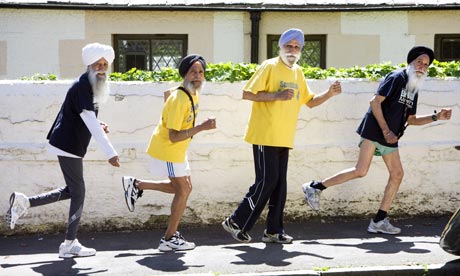
I am inspired. With the growing prevalence of cardiovascular disease, obesity and diabetes in our community – it is important to be inspired. Fauja Singh, Amrik Singh, Ajit Singh and Karnail Singh (with a combined age of 336) recently took part in the Edinburgh Marathon as part of the relay Sikhs in the City team. How have they stayed so healthy? The quartet agrees that a combination of a positive frame of mind, keeping the company of people who are forward looking, not indulging in any excesses, appreciating what God has provided them with and keeping active is the key to being healthy.
All four members of Sikhs in the City share an infectiously positive outlook and lust for life that is key to their ongoing success. Ajit Singh, 79, for instance, has just learned to ride a bicycle, so one of his goals now is to complete a triathlon. He and his lifelong friend Amrik Singh, also 79, have completed more than 1,000 races between them and acted as mentors to Fauja. Karnail Singh, 80, is the newest member of the team and the least experienced runner. His “experimentation” with course routes means that his teammates have to keep an eye on him, but what he lacks in kilometres he more than makes up for in providing the focus for a little gentle mickey-taking. [link]
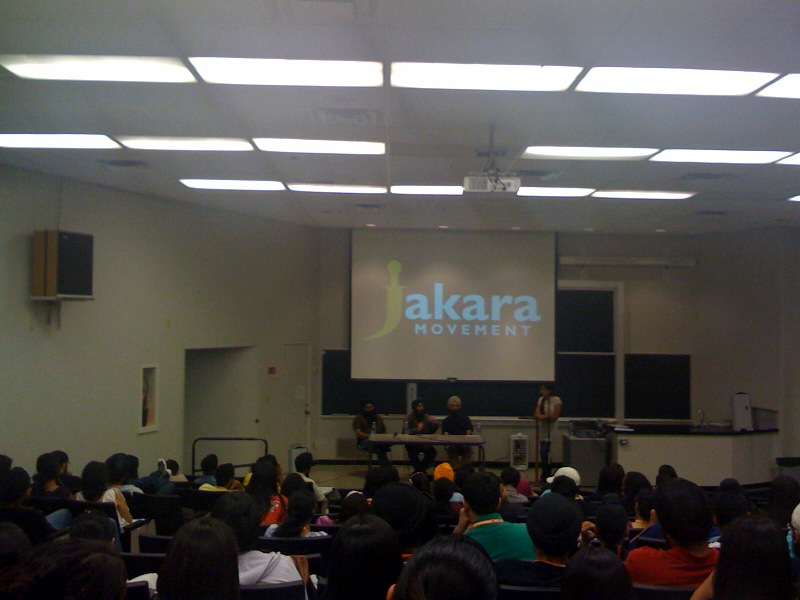 10 years ago the Jakara conference was born;
10 years ago the Jakara conference was born;
5 years ago the Jakara Movement was born.
This year was the 10th annual Jakara Movement conference. This year we Remember 1984.
From remembering the past, reflecting on Gurbani, reconnecting with the voices of the people, rethinking the role of the media, and revering our heroes and sheroes – it was an eventful Friday! Saturday included recognizing the lessons of 1984, reaffirming our commitment to the Sarbat Khalsa and Gurmata tradition of consensus building, recollecting with our brothers and sisters, reacting to their personal histories, responding to the past, and finally realizing a new reality is possible.
From evenings of recreation to days of reflection, the Jakara Movement Conference 2009 aimed to be inspirational, not only for those participating, but for the greater Sikh Qaum as well.
However, merely increasing one’s knowledge about 1984 is not enough. The Jakara Movement is providing avenues to respond and to engage with your community.
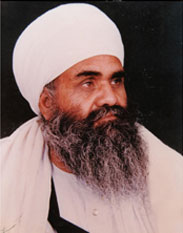 Earlier this week in B.C., hundreds of Sikhs protested the arrival of Mann Singh Pehowa, a granthi accused of rape, misconduct, and blasphemy.
Earlier this week in B.C., hundreds of Sikhs protested the arrival of Mann Singh Pehowa, a granthi accused of rape, misconduct, and blasphemy.
There is, of course, an underlying issue here regarding whether or not Pehowa supports his own dera, has encouraged blasphemy, etc. There is pretty widespread criticism of him, as an individual, as well as of his behavior. I do not want to use this opportunity to get into the nitty gritty of deras and blasphemy, but rather, to focus on the issue of religion and exploitation.
Earlier in the year, Sundari discussed sexual assault in the context of a larger community-level failure to ensure gender equity. Sexual abuse is not new to faith communities, but it evokes jarring feelings of betrayal, condemnation, and deep psychological trauma, both among those who are abused and among their loved ones.
 Things are heating up as Sikh transit workers organize against the MTA’s requirement that Sikh workers wear an MTA logo on their turbans. The rationale? The MTA’s position is that this policy is necessary for customers to identify their employees. However, neither the NY City Council, nor the U.S. Department of Justice, is buying this baloney. The 27 of the City Council’s 51 members recently voted to sign onto a letter to the MTA President, opposing the policy, and the Department of Justice has revived an employment discrimination case against the MTA.
Things are heating up as Sikh transit workers organize against the MTA’s requirement that Sikh workers wear an MTA logo on their turbans. The rationale? The MTA’s position is that this policy is necessary for customers to identify their employees. However, neither the NY City Council, nor the U.S. Department of Justice, is buying this baloney. The 27 of the City Council’s 51 members recently voted to sign onto a letter to the MTA President, opposing the policy, and the Department of Justice has revived an employment discrimination case against the MTA.
There are, of course, many ways that customers can identify MTA workers, from the badges they may wear, to a uniform vest, to a standard outfit. So why attempt to brand the turban, specifically? This policy shift, along with previous failed attempts, is indicative of the MTA’s general hostility to religious inclusion and work staff diversity.
Oh India. You can’t hide the skeletons in your closet forever.
It appears that the US Commission on International Religious Freedom was on its way to India this week. (The USCIRF is a federal group that works to promote freedom of thought, conscience and religion; protect people from abuses like detention, killing and torture; and challenge religious intolerance and repression throughout the world.) Well, they were scheduled to go, had their tickets ready and their bags packed. But India’s administration decided that they weren’t welcome in India.
It’s really quite ironic. The Congress party’s recent Parliamentary win over the BJP has been seen as an explicit rejection of the religious intolerance that the BJP represents (though it may have had more to do with support for Congress’ economic policies). Yet it is the Congress party administration that has refused USCIRF entry. Maybe the Congress party’s sound defeat of the BJP has swelled the Congress Party’s confidence a little too much.
New Delhi knew that the USCIRF team was scheduled to leave on June 12, but the visas just didn’t get stamped in time. Was it just a rare and regrettable oversight? [After all, with so many tourists flooding the country, a few visas could fall through the cracks right? (HA!)]
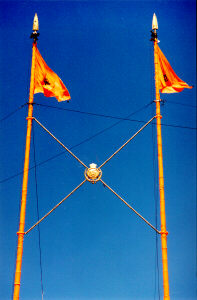 Play along with me here…imagine this Sunday you walk in to your local Gurdwara – remove your shoes, wash your hands, and as you make your way to the main darbar hall, you read the notices on the wall – “Education Committee holding Kirtan Classes Wednesday Night @ 6pm.” Next to that, another sign “Cultural Committee hosts Punjabi night next Saturday!” Further along, you see “Public Affairs Committee presents Interfaith Meeting on Friday.” Then right before you enter the darbar hall, you see…
Play along with me here…imagine this Sunday you walk in to your local Gurdwara – remove your shoes, wash your hands, and as you make your way to the main darbar hall, you read the notices on the wall – “Education Committee holding Kirtan Classes Wednesday Night @ 6pm.” Next to that, another sign “Cultural Committee hosts Punjabi night next Saturday!” Further along, you see “Public Affairs Committee presents Interfaith Meeting on Friday.” Then right before you enter the darbar hall, you see…
Human Rights Committee holding urgent action letter-writing workshop for two Indonesian prisoners of conscience, Sunday after Langar – and don’t forget the “Justice for Darfur” rally this Saturday morning, bus leaves at 8am Sharp!
Whoa! What kind of radical Gurdwara is this? What are the youth up to now? Is this one of those extremist Gurdwaras?
Or…is it the kind of Gurdwara Guru Sahib had intended?
Guru Nanak’s mission was based on the fundamental principle of human rights. We see this not only through his Baani, but throughout significant historical events – whether it was speaking out against the caste system and refusing to the wear the janeoo or his challenge of the tyrannical ruler Babar. Even in his ninth form, Guru Tegh Bahadur gave his life speaking out for a people whose practices he disagreed with, but supported their right to practice religion freely. He gave his life for the freedom of choice and the freedom of religion. There are several amazing stories of the Guru’s activism in the area of human rights and social justice…but strangely, this subject in the context of current events has now become taboo.
Continue Reading »
A recent article out of Surrey, Canada discusses an education and prevention video targeted at alcohol abuse in the Punjabi community. The video, titled Kharaab Daru-Bad Medicine, was created by Peace Arch Community Services – a social service agency based in British Columbia, Canada.
Kharaab Daru-Bad Medicine, which premiers this week in Delta, is hoped to become a resource in the prevention and reduction of alcohol misuse and abuse within the Punjabi community, said director Kevin Letourneau, PACS’ manager of addiction services.
The video is in Punjabi with English subtitles and aims to address the prevalence of alcohol abuse in our community.
In Bad Medicine well known Punjabi speaking professionals along with individuals impacted by alcohol, share their knowledge with respect to the harms and risks associated with problem drinking, mistaking alcohol as medicine, how alcohol impairs mental and physical functioning, drinking and driving, addiction and family violence, and the benefits of recovery.
The Director of Peace Arch Community Services (PACS) rightfully notes that alcohol abuse is one of those “closet things” in the Punjabi community and is often used as a way to cope with various societal pressures. The need for the video came about after group counseling at PACS which involved Punjabi men who were court-ordered to get help after committing crimes while under the influence. A similar video was launched by Drug and Alcohol Action Programme (an organization addressing these issues for our community in the UK) last year and addresses the issue of both alcohol and drug use. The video, which I have included after the jump, was also presented in Punjabi with English subtitles. I think it’s vital that this education continues to be provided using Punjabi to provide greater awareness and accessibility to the community. We need to wake up and start facing our problems and we need to start holding our community accountable.
I wanted to take the time to highlight two issues (Part 2 to be posted soon) which have plagued the Punjabi Sikh community for many, many years. I know that discussing these issues over and over again is overwhelmingly tedious for the majority of people. Quite frankly, I agree. However, if I didn’t believe that having these important discussions and bringing awareness to these issues over (and over, and over) again added some value to potential solutions – then I wouldn’t waste the space. Needless to say, these issues don’t seem to be going away which means these conversations are that much more important to have.
A recent article in the NYTimes expresses surprise at the fact that female feticide is occurring within immigrant communities residing in the United States. The thought seems to be that preference of male children should ideally disappear with assimilation into western societies. (For those of us hanging out in The Langar Hall, we know this isn’t always the case in the Punjabi community). The article uses US Census Data to provide quantitative evidence that there exists a bias for male children in certain Asian American communities.
Demographers say the statistical deviation among Asian-American families is significant, and they believe it reflects not only a preference for male children, but a growing tendency for these families to embrace sex-selection techniques, like in vitro fertilization and sperm sorting, or abortion.
New immigrants typically transplant some of their customs and culture to the United States – from tastes in food and child-rearing practices to their emphasis on education and the elevated social and economic status of males. [emphasis added]
This latter point is especially significant. Is the problem of sex-selective abortions purely cultural and is that why it continues to be an “acceptable” problem?
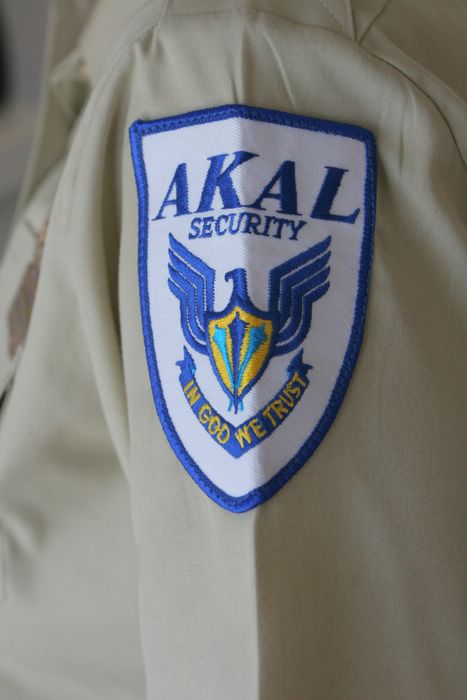 Just before the weekend, NPR featured a story on Akal Securities and the Sikh community in New Mexico. The article discusses the success of a number of businesses that help support the 3HO organization. It is partly due to these generous contributions by community members and leaders of these businesses that as a community we benefit from the inspiring resources such as Sikhnet.com. As an attendee at the annual Los Angeles Vaisakhi Nagar Kirtan, I have witnessed the beautiful display of the Sikh community, largely led by members of the 3HO, year after year.
Just before the weekend, NPR featured a story on Akal Securities and the Sikh community in New Mexico. The article discusses the success of a number of businesses that help support the 3HO organization. It is partly due to these generous contributions by community members and leaders of these businesses that as a community we benefit from the inspiring resources such as Sikhnet.com. As an attendee at the annual Los Angeles Vaisakhi Nagar Kirtan, I have witnessed the beautiful display of the Sikh community, largely led by members of the 3HO, year after year.
For those familiar with Akal Securities, you can find their ubiquitous khanda symbol everywhere. From airports, to security guards in front of Target, I have had a sense of pride whenever I see their logo. It is a tremendous example of our Sikh brethren being successful and specifically an example of individuals that use their success to contribute to the Sikh community in general. This is not to say that the company has not had its share of problems (and successes), but still I believe it is a model and a successful one and deserves recognition.
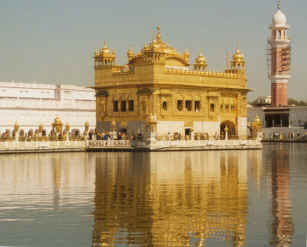 For some Sikhs in Punjab, apparently two Harmandar Sahibs. Or at least that’s the argument between the SGPC and a group of Sikhs. The SGPC argues that a group of Sikhs are building a replica of Harmandar Sahib, and that they stridently oppose any “imitation” gurdwaras (my phrase, not theirs).
For some Sikhs in Punjab, apparently two Harmandar Sahibs. Or at least that’s the argument between the SGPC and a group of Sikhs. The SGPC argues that a group of Sikhs are building a replica of Harmandar Sahib, and that they stridently oppose any “imitation” gurdwaras (my phrase, not theirs).
The Sikhs, who are definitely building a gurdwara (but whether or not it is intended to be a replica is contested), argue that the SGPC is trying to stir up trouble and adopting wedge politics tactics to scramble for power.
At first I read this story and thought to myself, “Wow, that is wacky.” But the longer I’ve reflected on it, the more I have to ask — REALLY???
Ravi Singh Bhalla was elected to the City Council in Hoboken, New Jersey this past week! A city that is less than 1% Asian and predominately white, Hobokens elected Bhalla with 5,810 votes. Bhalla had the highest number of votes amongst the 6 candidates competing for the 3 council seats.
In an e-mail out to supporters, Ravi’s brother, Amardeep Singh, described the bigotry they received during this campaign. He writes:
“… elections are not always for the faint of heart … we were cursed at constantly, literature was ripped out of our hands and stomped on, I was told by someone “I love killing Arabs”, and I was asked whether I “had a green card.”
Despite these attacks, the residents of Hoboken voted for Bhalla because he was a committed candidate who focused on the issues. Bhalla says, “It’s very humbling … it shows that people were focused on what a candidate brought to the table.”
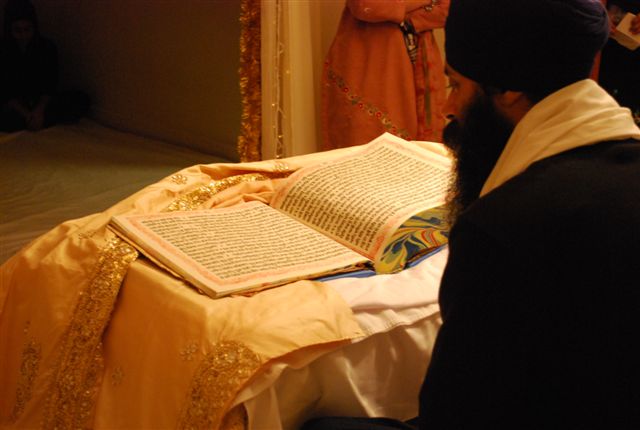 A few weeks back, an article called Outsourcing Prayers [scroll to the bottom], by Khushwant Singh caught my attention. It discussed how people pay big money to religious institutions abroad to carry out services and prayers on their behalf. This “outsourcing” of prayer helps out the “well-to-do” Americans and Europeans who do not have time for worship, while also benefiting cash-starved churches and the local economy of these remote areas. Several religions were mentioned in this article and Sikhs were not spared:
A few weeks back, an article called Outsourcing Prayers [scroll to the bottom], by Khushwant Singh caught my attention. It discussed how people pay big money to religious institutions abroad to carry out services and prayers on their behalf. This “outsourcing” of prayer helps out the “well-to-do” Americans and Europeans who do not have time for worship, while also benefiting cash-starved churches and the local economy of these remote areas. Several religions were mentioned in this article and Sikhs were not spared:
I sought explanation from the head granthi. He told me people from India and abroad sent money for akhand paths to be followed by Guru-ka-langar as thanksgiving or wish fulfillment. I could not comprehend how prayers recited by someone else could benefit a devotee who paid for them.?
There has been much debate in our community on whether paying a professional to do an Akhand Paath on one’s behalf is contradictory to Gurmat. I also remember years ago when the SGPC was “selling” Akhand Paaths on-line. Luckily, outrage from Sikhs all over the world stopped that practice. However, this article got me thinking about Akhand Paaths, and the role it currently plays in our community.
Joint post by Mapleleaf Sikh, Sundari, Jodha, Camille, Phulkari, RP Singh, Reema
It has been 25 years and we remember.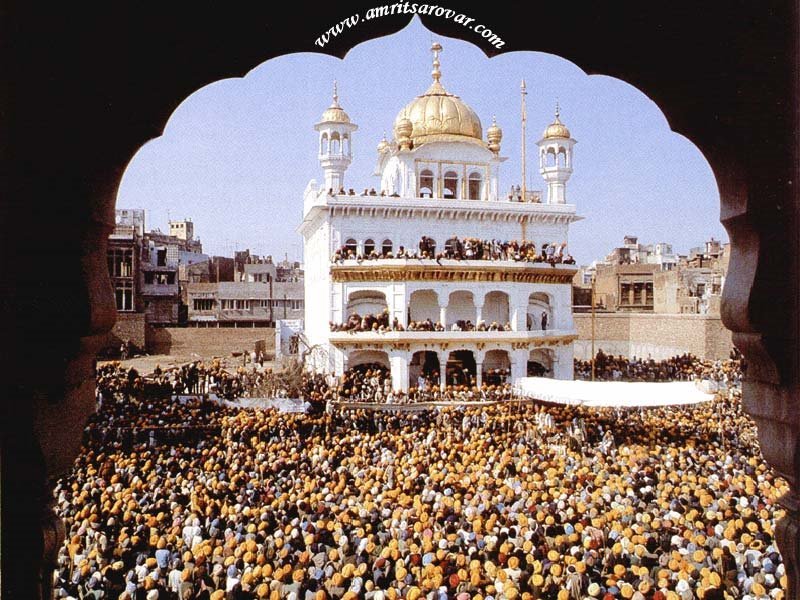
On this day we remember; in this week we remember; in this month we remember; in this year we remember. On June 6th we stopped to remember the recent chapter in the history of the Sikhs.
When the topic of 1984 is brought up, most Sikhs have one of two reactions. For many, it strikes a deep chord. It awakens a memory of what Professor Tatla calls a “critical” event, one of those rare instances that shapes lives far beyond the incident’s physical reach. It is an event that every Sikh knew, even at the time, had marked the fabric of Sikhs’ history and set off a sequence of events that would stay with us indefinitely.
For others, it involves resurrecting the tragic shadow from the past that they would much rather leave behind and forget. They say, “Let’s focus on the future.” “What’s done is done, and we must live in the present and look forward. Memories of the event only serve to create additional hatred and anger.”
We, at TheLangarHall, choose to remember.
We do not hold onto fear, anger, or hatred. We understand that time does not stop. Guru Gobind Singh Ji often spoke in the future tense. We look to the future as well.
However, to look forward, we do not need to forget the past. In Ardaas, along with Asa di Vaar that is to be done as a “community,” we share and take inspiration from Sikh sheroes and heroes.
In order to move forward with dignity, we seek justice and truth, to expose the events of 1984 and state-terrorism in the subsequent decade. We criticize and scrutinize our own roles and failings so that we may learn a lesson from this chapter of our history. We celebrate and decide our own heroes and sheroes, without seeking approval from anyone else.
This is our history. This is our truth. It must be recorded. Atonements and reparations must be made. We will write our own history, unlike many Sikhs in the past. We hold pens and no longer are forced to live in the Lakhi Jungle. We will not let others write our history. It is our history; it is about us, by us, and our perspectives will be heard.
[For background information on events leading up to Operation Bluestar, see chronology and resources on Ensaaf‘s site.]
Below, we share with you, why each of us individually remembers.
